Case No. SCSL-2003-01-T
THE PROSECUTOR OF SPECIAL COURT
V.
CHARLES GHANKAY TAYLOR
Wednesday, 30 May 2012
11.00 a.m
SENTENCING HEARING
TRIAL CHAMBER II.
[Upon commencing at 11.00 a.m.]
THE REGISTRAR: All rise. Please be seated.
The Special Court for Sierra Leone is sitting in an open session and for the
Sentencing Judgement in the case of the Prosecutor versus
Charles Ghankay Taylor, Justice Richard Lussick presiding.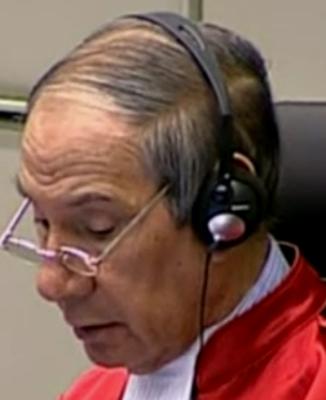
On the 26th of April, 2012, the Trial Chamber rendered its Judgement, delivered
in summary form, finding the Accused, Charles Ghankay Taylor, guilty of aiding
and abetting the
commission of the crimes set forth in counts 1 to 11 of the indictment, pursuant
to Article 6.1 of the Statute, as well as planning the commission of the crimes
set forth in the counts 1 to 11 of the indictment, which took place during the
attack on Kono and Makeni in December 1998 and in the invasion of and retreat
from Freetown between December 1998 and February 1999.
On 18th of May, 2012, the Trial Chamber filed its Judgement. The Trial Chamber scheduled a sentencing hearing for 16 May, 2012, and the parties submitted relevant information for the assistance of the Trial Chamber pursuant to Rule 100(A) of the Rules. The Prosecution sentencing brief was filed on the 3rd of May. The Defence sentencing brief was filed on 10th of May. At a sentencing hearing on 16 May, 2012, oral submissions were made by the parties and a statement was made by the accused.
The Prosecution submits that considering
the extreme magnitude and seriousness of the crimes that were committed against
the people of Sierra Leone, for which Mr Taylor has been found responsible, the
appropriate sentence for Charles Taylor is imprisonment for a term of not less
than 80 years.
The Defence did not specify what sentence should be imposed but submits that
despite the gravity of the underlying crimes for which Mr Taylor has been
convicted, the 80-year sentence proposed by the Prosecution is "manifestly
disproportionate and excessive."
The Trial Chamber considered the written and oral submissions of the parties and the statement of the Accused in the determination of an appropriate sentence. The Sentencing Judgement, which I said will be filed today, includes a preliminary section on Applicable Law and a summary of the submissions of the parties, which I will not read out in court.
The accused has been found responsible for aiding and abetting, as well as planning, some of the most heinous and brutal crimes recorded in human history. The Trial Chamber is of the view that the offences for which the accused has been convicted - acts of terrorism, murder, rape, sexual slavery, cruel treatment, recruitment of child soldiers, enslavement, and pillage - are of the utmost gravity in terms of the scale and brutality of the offences, the suffering caused by them on victims and the families of victims, and the vulnerability and number of victims.
In determining an appropriate sentence for the Accused, the Trial Chamber has taken into account the tremendous suffering caused by the commission of the crimes for which the Accused is convicted of planning and aiding and abetting, and the impact of these crimes on the victims, physically, emotionally, and psychologically. The Trial Chamber recalls the tremendous loss of life - innocent civilians burned to death in their homes, or brutally killed by maiming and torture. The amputation of limbs was a hallmark of terror and cruelty visited upon innocent civilians.
For those who survived these crimes, the
long-term impact on their lives is devastating - amputees without arms who now
have to live on charity because they can no longer work;
young girls who have been publicly stigmatised and will never recover from the
trauma of rape and sexual slavery to which they was subjected, in some cases
resulting in pregnancy and additional stigma from the children born thereof;
child soldiers, boys and girls who are suffering from public stigma highlighted
by the identifying marks carved on their bodies and enduring the after-effects
of years of brutality, often irreparable alienation from their family and
community; all as a consequence of the crimes for which Mr Taylor stands
convicted of aiding and abetting and planning.
The Defence aptly describe "the pain of lost limbs, the agony of not only rape in its commonly understood sense, but also the rape of childhood, the rape of innocence, possibly the rape of hope." The Trial Chamber witnessed many survivors weeping as they testified, a decade after the end of the conflict. Their suffering will be life-long.
In the assessing the gravity of the crimes
committed, the Trial Chamber recalls the evidence of several witnesses whose
testimony highlights the brutality of the crimes comitted, the suffering caused
by these crimes on the victims, and their vulnerability. Witnesses TF1-064 was
forced to carry a bag containing human heads to Tombodu. On the way, the rebels
ordered her to laugh as she carried the bags dripping with blood. TF1-046
testified that when they arrived at Tombodu, the bag was emptied and she saw the
heads of her children.
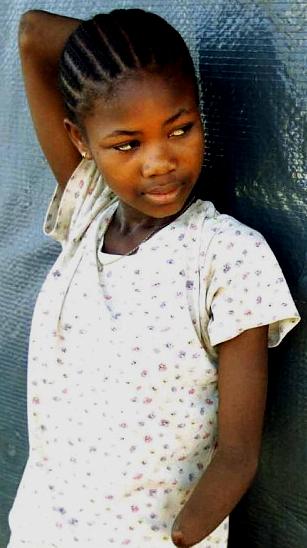
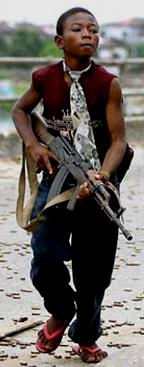
Witness TF1-143 was 12 years old when he and 50 other boys and girls were captured by Revolutionary United Front rebels in September 1998 in Konkoba. The rebels turned him into a child soldier after carving the letters "RUF" on his chest. Having been told to amputate the hands of those who resisted him, this 12 year old subsequently used a machete to amputate the hands of men who had refused to open the door of their shop. When ordered on a food-finding mission to rape an old woman they found at a farmhouse, the boy cried and refused, for which he was punished.
The Trial Chamber recalls the testimony of TF1-358, who treated a young nursing mother whose eyes had been pulled out from their sockets after she was gang raped by seven armed rebels so that she would not be able to later identify them.
The scale and brutality of the crimes committed in Sierra Leone, as demonstrated by these individual incidents, is also clearly demonstrated by the code names given by the perpetrators to the military campaigns in which the crimes were committed. Names such as Operation Spare No Soul and Operation No Living Thing indicating, the indiscriminate killing of anything that moved, speak for themselves as to the gravity of the crimes committed.
The Trial Chamber notes that the effects of
these crimes on the families of the victims, as well as the society as a whole,
are devastating. A number of physically handicapped
Sierra Leoneans have been left unable to do the simplest task we take for
granted as a direct result of amputation. Many of the victims were productive
members of society, breadwinners for their families, and are now reduced to
beggars, unable to work as a result of the injuries inflicted on them. They are
no longer productive members of society.
Particularly reprehensible were the crimes committed against vulnerable groups. Girls and women were raped, subjected to sexual slavery, and in many cases unwanted pregnancy. Pregnant women were cut open to settle bets as to the sex of the unborn child. Child soldiers, both boys and girls, had their innocence stolen and were forced to commit murders, rapes, and mutilations at a very young age, their lives permanently marred by these traumatic experiences.
Elderly men and women, a particularly vulnerable group, were also affected by the crimes committed, their dignity violated by brutal attack and cruel treatment.
In assessing the role of Mr Taylor, the Trial Chamber has considered the modes of liability under which he was convicted, as well as the nature and degree of his participation. The Trial Chamber recalls that Mr Taylor's conviction for aiding and abetting the commission of crimes by the Armed Forces Revolutionary Council/Revolutionary United Front is based on a number of interventions. In addition to supplying arms and ammunition and providing military personnel, Mr Taylor provided various forms of sustained operational support, including communications and logistical support. In addition to this practical assistance, Mr Taylor also provided encouragement and moral support through ongoing consultation and guidance. The cumulative impact of these various acts of aiding and abetting heightens the gravity of Mr Taylor's criminal conduct in the view of the Trial Chamber. Moreover, the steady flow of arms and ammunition that he supplied extended the duration of the Sierra Leone conflict and the commission of crimes it entailed.
Had the RUF/AFRC not had this support from Mr Taylor, the conflict and commission of crimes might have ended much earlier.
With regard to Mr Taylor's conviction for planning the commission of crimes in the attacks on Kono and Makeni, and in the invasion of and retreat from Freetown between December 1998 and February 1999, the Trial Chamber notes the submission by the Defence distinguishing the design of the overall operation from the planning of the actual crimes that were perpetrated. The Trial Chamber does not accept this distinction and recalls its finding that having drawn up the plan with Bockarie, Mr Taylor followed its implementation closely via daily communications, either directly or through Benjamin Yeaten.
The Prosecution argues that the length of time over which the crimes were committed, spanning up to five years, should be taken into account as an aggravating factor. The Trial Chamber has considered this issue in the context of its consideration of the gravity of the offence rather than as an aggravating factor.
With regard to the duration of the crimes
committed, the Defence submits that the bulk of crimes occurred within an
18-month period in 1998 and 1999, not the longer period of five years set forth
by the Prosecution. The Trial Chamber notes that the Prosecution has outlined
various time-periods for various crimes, with the time-periods as a whole
spanning five years. The Trial Chamber notes the Defence acknowledgment that the
full time span of crimes committed is five years, as documented in its own chart
of the temporal range of counts. In the Trial Chamber's view, it is clear from
the evidence, as supported by the submissions of both Parties, that the length
of time over which the crimes were comitted was five years, with a concentration
of the crimes having been committed during an 18-month or two-year period within
the five-year time span. In the Trial Chamber's view, the length of time over
which the crimes continued heightens the gravity of the offence.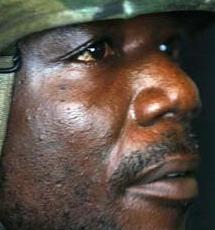
The Defence submits that Mr Taylor's age, health, and family circumstances "constitute the essence of the individual circumstances contemplated in Article 19(2) of the Statute" and that they may be regarded as mitigating factors. Mr Taylor is 64 years old. The Trial Chamber is not aware of any serious concerns relating to his health, and no medical evidence has been submitted relating to his health.
The Trial Chamber notes that Mr Taylor has and will continue to have access to medical attention as needed throughout the period of his sentence. His age and the fact that he is married with children are not, in the Trial Chamber's view, mitigating factors in this case. Further, his social, professional, and family background, which the Defence submits, shows the likelihood of rehabilitation, is not a mitigating factor in the Trial Chamber's view.
The Trial Chamber recalls that the Special Court Appeals Chamber, as well as the ICTY Appeals Chamber, has held that the primary objectives in sentencing must be retribution and deterrence. Moreover, in the absence of Mr Taylor's acceptance of responsibility or remorse for the crimes committed, the Trial Chamber does not consider the likelihood of rehabilitation to be significant, nor is it demonstrated by his social, professional, and family background.
In light of these considerations, the Trial Chamber finds that nothing in Mr Taylor's personal circumstances justifies any mitigation of his sentence.
The Defence and Mr Taylor have both
highlighted their contention that the Accused was singled out for selective
prosecution. The Trial Chamber has addressed this issue in its
Trial Judgement and found that Mr Taylor was not singled out for selective
prosecution. In the Trial Chamber's view, this is not relevant to sentencing.
On the question of time served, on the 7th
of March, 2003, the indictment against Mr Taylor was approved by the Special
Court under seal and a warrant for Mr Taylor's arrest was
issued. On the 4th of June, 2003, the indictment and warrant of arrest were
publicly disclosed and formally unsealed one week later. On 11th of August,
2003, Mr Taylor stepped down from the presidency. He went into exile to Nigeria
where he remained until 29th of March, 2006, when he was arrested by Nigerian
authorities following a request by Liberian President Johnson Sirleaf that he be
surrendered to the Special Court pursuant to his warrant of arrest.
On the same day, he was handed over to the Liberian authorities who in turn transferred him to the custody of the Special Court. For security reasons, by order of the President of the Court, in June 2006 Mr Taylor was transferred from Freetown to the Netherlands to stand trial in The Hague, where he has been on remand since.
The Defence submits that in addition to the
time he has spent in the custody of the Court, Mr Taylor should be credited for
time that he spent in Nigeria prior to his transfer, an
additional 2 years and seven months. The Defence submits that during this time
Mr Taylor was effectively under house arrest and at that time, therefore,
constitutes detention, highlighting the conditions of his stay in Nigeria as set
forth in Exhibit D-406.
The Prosecution submits that Mr Taylor was not under house arrest highlighting his own testimony that he was free to go where he wanted during this time. Rule 101(D) of the Special Court's Rules of Procedure and Evidence provides that credit for time served shall be taken into consideration for any period "during which the convicted person was detained in custody pending his transfer to the Special Court or pending trial or appeal." The Trial Chamber notes that house arrest has been recognised as a form of detention pending surrender which might be considered for purposes of crediting a convicted person for time served. However, in the case of Mr Taylor, the period of time he spent in Nigeria cannot be considered, in the Trial Chamber's view, as having taken place pending his transfer to the Court and therefore does not fall within the scope of Rule 101(D). Mr Taylor's time in Nigeria was not unrelated to his effort to avoid the jurisdiction of the Court, and during his time in Nigeria the Court was in no way involved in the conditions governing his stay there. It is from 29th of March, 2006, that Mr Taylor was detained in custody pending his transfer to the Court.
The Trial Chamber further notes, as
highlighted by the Prosecution, that Mr Taylor himself testified that he was not
under house arrest during the period of time he was in Nigeria
following his departure from Liberia. Exhibit D-406 is cited by the Defence as
listing the conditions of his stay in Nigeria and including serious restrictions
on his movement and liberty. The Trial Chamber notes that the conditions listed
in Exhibit D-406 are set forth as "conditions of Asylum for Former President
Charles Taylor." They list a number of obligations of Mr Taylor, and of Nigeria.
The obligations of Mr Taylor include his abstention from subversive activities
against Nigeria and from political activities in or military incursions into
Liberia. The restrictions on his movement are the requirement that he obtain
clearance to leave the city limits of Calabar and that he be accompanied on any
travel outside Calabar by a Nigerian escort officer.
Security is listed as an obligation of
Nigeria to provide protection to Mr Taylor. The Trial Chamber does not find that
these conditions governing the asylum offered to Mr Taylor
by the government of Nigeria can be considered to constitute house arrest, as
alleged by the Defence.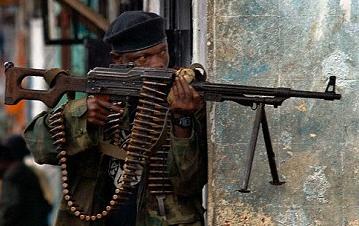
In light of these consideration, for the
reasons of fact and law, the Trial Chamber does not credit Mr Taylor for the
period of time that he spent in Nigeria prior to his arrest and
finds that his detention for the purpose of credit for time served commenced on
29th of March, 2006.
The Defence has set forth a number of
factors to be considered in mitigation of sentence, while the Prosecution
submits that there are no significant mitigating factors. The Trial Chamber has
addressed the role of Mr Taylor in the peace process for Sierra Leone at length
in its Judgement and finds that while Mr Taylor publicly played a substantial
role in
this process, including as a member of the ECOWAS Committee of Five, later
Committee of Six, secretly he was fuelling hostilities between the AFRC/RUF and
the democratically elected authorities in Sierra Leone, by urging the former not
to disarm and by actively providing them with arms and ammunition. For this
reason, the Trial Chamber does not find Mr Taylor's role in the peace process to
be a mitigating factor in sentencing. The Trial Chamber notes the constructive
role Mr Taylor played in the release of UN peace keepers and other hostages, but
in light of the gravity of the crimes does not consider this intervention a
significant mitigating factor.
The Defence submits that Mr Taylor's record of public service to his country, and his resignation from office, are mitigating factors. With regard to his resignation from office and departure from Liberia, the Trial Chamber notes the circumstances at the time, including the indictment by this Court, and does not find that his public service, or his resignation from office and departure from Liberia, to be mitigating factors in sentencing.
The Defence suggests that the co-operation
of Mr Taylor with the Prosecution and the Court should be considered in
mitigation. The Trial Chamber recalls that Mr Taylor directed
his counsel to disregard orders of the Trial Chamber and does not consider that
Mr Taylor co-operated with the Prosecution and the Court. For this reason,
co-operation cannot be considered a mitigating factor for sentencing.
The Defence submits that expressions of
sympathy and compassion by Mr Taylor for the victims of the crimes committed
should be taken into account as a mitigating factor. Although the Defence
accepted that crimes were comitted in Sierra Leone, it nevertheless put the
Prosecution to proof beyond reasonable doubt of the crimes charged in the
indictment, necessitating the testimony of numerous victims who relived in this
Court the pain and suffering they experienced. In his statement to this Court,
Mr Taylor said, "Terrible things happened in Sierra Leone and there can be no
justification for terrible crimes." Mr Taylor has not accepted responsibility
for the crimes of which he stands convicted, and the Trial Chamber does not
consider this statement, and the other comments made by Mr Taylor, to constitute
remorse that would merit recognition for sentencing
purposes.
The Defence submits that Mr Taylor's lack
of a prior criminal record and his good conduct in detention should be
considered as mitigating factors. The Trial Chamber notes the
report submitted by the Defence of Mr Taylor's good conduct in detention and has
taken this report into account, although it does not consider this factor to
have great significance in light of the gravity of the crimes committed.
Similarly, with regard to Mr Taylor's lack of a prior criminal record, in light
of the gravity of the crimes committed, this is not, in the Trial
Chamber's view, a significant factor. Moreover, the Trial Chamber notes the
question raised by the Prosecution - Who was in a real position of power or
authority to prosecute the president of Liberia? The Trial Chamber considers
that while not impossible, it is difficult to prosecute a head of state.
The Defence submits that the hardship on Mr
Taylor of serving a sentence outside his country of origin should be a
mitigating factor. Trial Chamber notes that the determination as
to where Mr Taylor will serve his sentence shall be made by the president of the
Court following sentencing, pursuant to Rule 103 of The Rules of Procedure and
Evidence and recalls the determination of the Appeals Chamber that the fact that
a sentence is to be served in a foreign country should not be considered in
mitigation.
The Trial Chamber recalls that Mr Taylor
was found not guilty of participation in a joint criminal enterprise, and not
guilty of superior responsibility for the crimes committed. A conviction on these
principal or significant modes of liability might have justified the sentence of
80 years' imprisonment proposed by the Prosecution. However, the Trial Chamber
considers that a sentence of 80 years would be excessive for the modes of
liability on which Mr Taylor has been convicted, taking into account the limited
scope of his conviction for planning the attacks on Kono and Makeni in December
1998 and the invasion of and retreat from Freetown between December 1998 and
February 1999.
The Prosecution argues that Mr Taylor's "willing and enthusiastic participation" in the crimes constitutes an aggravating factor, citing his detailed knowledge of the crimes that were committed. The Defence contends that to consider this an aggravating factor would amount to "double counting" elements of the evidence for which Mr Taylor was convicted.
The Trial Chamber agrees that Mr Taylor's knowledge of the crimes is an element of his conviction and cannot be considered an aggravating factor.
The Prosecution argues that Mr Taylor's leadership role, as president of Liberia, and as a member of the ECOWAS Committee of Five, imbued him with inherent authority, which he abused to "fan the names of conflict. The Defence contends that this argument fails the pleading requirement and cites jurisprudence which the Trial Chamber has considered in its discussions of applicable law. The Trial Chamber notes that the precedents cited state more broadly than suggested by the Defence that aggravating circumstances are "those circumstances directly related to the commission of the offence charged." As the leadership role of Mr Taylor during the indictment period is directly related to the commission of the offences with which he was charged, the Trial Chamber has considered this role as an aggravating factor.
The Trial Chamber notes that as president of Liberia, Mr Taylor held a position of public trust, with inherent authority, which he abused in aiding and abetting and planning the commission of the crimes for which he has been convicted. As a head of state, and as a member of the ECOWAS Committee of Five, and later Committee of Six, Mr Taylor was part of the process relied on by the international community to bring peace to Sierra Leone. But his actions undermined this process, and rather than promote peace, his role in supporting the military operations of the AFRC/RUF in various ways, including through the supply of arms and ammunition, prolonged the conflict. The lives of many more innocent civilians in Sierra Leone were lost or destroyed as a direct result of his actions.
As president and as Commander-in-Chief of the Armed Forces of Liberia, Mr Taylor used his unique position, including his access to state machinery and public resources to aid and abet the commissions of crimes in Sierra Leone, rather than using his power to promote peace and stability in the sub-region. The Trial Chamber finds that Mr Taylor's special status, and his responsibility at the highest level, is an aggravating factor of great weight. There is no relevant sentencing precedent for heads of state who have been convicted of war crimes and crimes against humanity, but as Mr Taylor himself told the Trial Chamber, "I was president of Liberia. I was not some petty trader on the streets of Monrovia."
The Trial Chamber notes that the actions of
Mr Taylor, then president of Liberia, caused and prolonged the harm and
suffering inflicted on the people of Sierra Leone, a neighbouring country not
his own. While Mr Taylor never set foot in Sierra Leone, his heavy foot-print is
there, and the Trial Chamber considers the extraterritoriality of his criminal
acts to be an aggravating factor.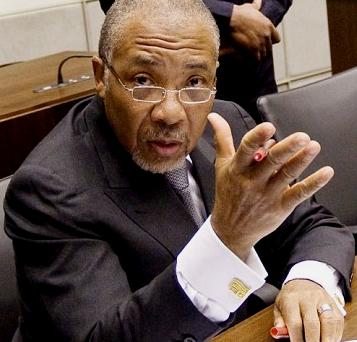
The Trial Chamber found that there was a continuous supply by the AFRC/RUF of diamonds mined from areas in Sierra Leone to Mr Taylor, often in exchange for arms and ammunition. Mr Taylor repeatedly advised the AFRC/RUF to capture Kono, a diamondiferous area, and to hold Kono and to recapture Kono so that they would have access to diamonds which they could use to obtain from him and through him the arms and ammunition that were used in military operations to target civilians in a campaign of widespread terror and destruction. Mr Taylor benefitted from this terror and the destruction through a steady supply of diamonds from Sierra Leone. His exploitation of the conflict for financial gain is, in the view of the Trial Chamber, an aggravating factor.
The Trial Chamber notes that although the
law of Sierra Leone provides for the sentencing of an accessory to a crime on
the same basis as a principal, the jurisprudence of this
Court, as well as that of the ICTY and ICTR, holds that aiding and abetting as a
mode of liability generally warrants a lesser sentence than that imposed for
more direct forms of
participation. While generally the application of this principle would indicate
a sentence in this case that is lower than the sentences that have been imposed
on the principal perpetrators who have been tried and convicted by this Court,
the Trial Chamber considers that the special status of Mr Taylor as a head of
state puts him in a different category of offenders for the purpose of
sentencing.
Although Mr Taylor has been convicted of planning, as well as aiding and abetting, his conviction for planning is limited in scope. However, Mr Taylor was functioning in his own country at the highest level of leadership, which puts him in a class of his own when compared to the principal perpetrators who have been convicted by this Court.
Leadership must be carried out by example,
by the Prosecution of crimes, not the commission of crimes. As we enter a new
era of accountability, there are no true comparators for
which the Trial Chamber can look for precedent in determining an appropriate
sentence in this case. However, the Trial Chamber wishes to underscore the
gravity it attaches to Mr Taylor's betrayal of public trust. In the Trial
Chamber's view, this betrayal outweighs the distinctions that might otherwise
pertain to the modes of liability discussed above.
Accordingly, the Trial Chamber is of the view that his unique status as head of state and the other aggravating factors set forth above, should be reflected in his sentence.
Mr Taylor, would you please rise for the sentence of the Court.
Mr Taylor, for the foregoing reasons, the Trial Chamber unanimously sentences you to a single term of imprisonment of 50 years for all of the counts on which you've been found guilty.
Credit shall be given to you for the period commencing from 29th of March, 2006, during which you were detained in custody pending this trial.
Thank you. You can be seated, Mr Taylor.